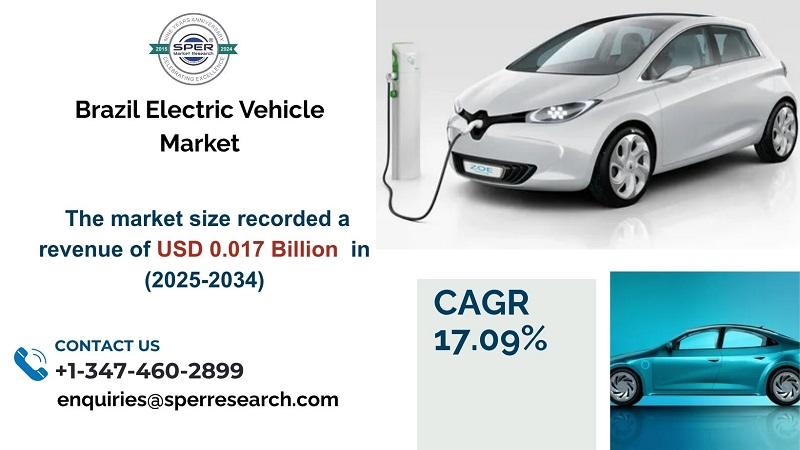Brazil Electric Vehicle Battery Market Latest Trends, Growth 2034

A rechargeable power source that provides energy to electric vehicles is called an electric vehicle (EV) battery. In contrast to conventional internal combustion engines, which run on gasoline, electric motors are powered by electricity stored in EV batteries. Because of their great energy density, longevity, and effectiveness, these batteries are usually lithium-ion. They are composed of many cells arranged in packs and modules to provide reliable performance. The range of an electric vehicle is determined by the capacity of its batteries, which can be charged at standard or fast-charging stations. The transition to sustainable transportation is being fueled by EV batteries' increasing efficiency, affordability, and environmental friendliness as technology develops.
According to SPER market research, ‘Brazil Electric Vehicle Battery Market Growth, Trends, Analysis, Size- By Vehicle Type, By Propulsion Type, By Battery Type, By Distribution Channel- Regional Outlook, Competitive Strategies and Segment Forecast to 2033’ state that the Brazil Electric Vehicle Battery Market is estimated to reach USD 0.017 billionby 2033 with a CAGR of 17.09%..
Drivers:
Brazil's market for EV batteries is growing as a result of encouraging government policies and rising EV adoption. Battery adoption is fueled by rising consumer demand for environmentally friendly transportation as well as Brazil's robust renewable energy sector, particularly hydropower. Infrastructure expansion is being accelerated by strategic alliances and investments, such as Raizen's Shell Recharge charging network and BYD's EV manufacturing activities. Another goal of the New Industry Brazil program is to enhance local supply chains by bringing lithium cell manufacturing home. These developments, along with international R&D initiatives to increase battery longevity, cost effectiveness, and energy density, are setting Brazil up for explosive growth in the EV battery market.
To Know More Insights of the Report, Visit
Restraints:
There are still major obstacles, though. Due to the high cost of producing lithium-ion batteries, many Brazilian consumers cannot afford EVs, which restricts their use to higher-income groups. Brazil now relies on imported battery modules, mostly from China, due to a lack of domestic cell manufacturing, which increases supply-chain risk. Beyond major cities, there is still a dearth of charging infrastructure, making long-distance EV use difficult. The industry is also uncertain as a result of political pressure to increase EV import tariffs. In the fields of sophisticated batteries and digital technologies, a lack of skilled workers further impedes innovation and growth. A broader market expansion is still hindered by these limitations.
For More Information, refer to below link: –
Brazil Electric Vehicle Market Trends and Competitors
São Paulo dominates Brazil’s electric vehicle battery market, thanks to its strong industrial base, concentration of automotive and battery suppliers, and advanced electric mobility infrastructure in the Southeast region. Some of the key market players are BMW, BYD, CAOA Chery, JAC Motors, Nissan and others.
Follow Us –
LinkedIn | Instagram | Facebook | Twitter
Contact Us:
Sara Lopes, Business Consultant — USA
SPER Market Research
enquiries@sperresearch.com
+1–347–460–2899




